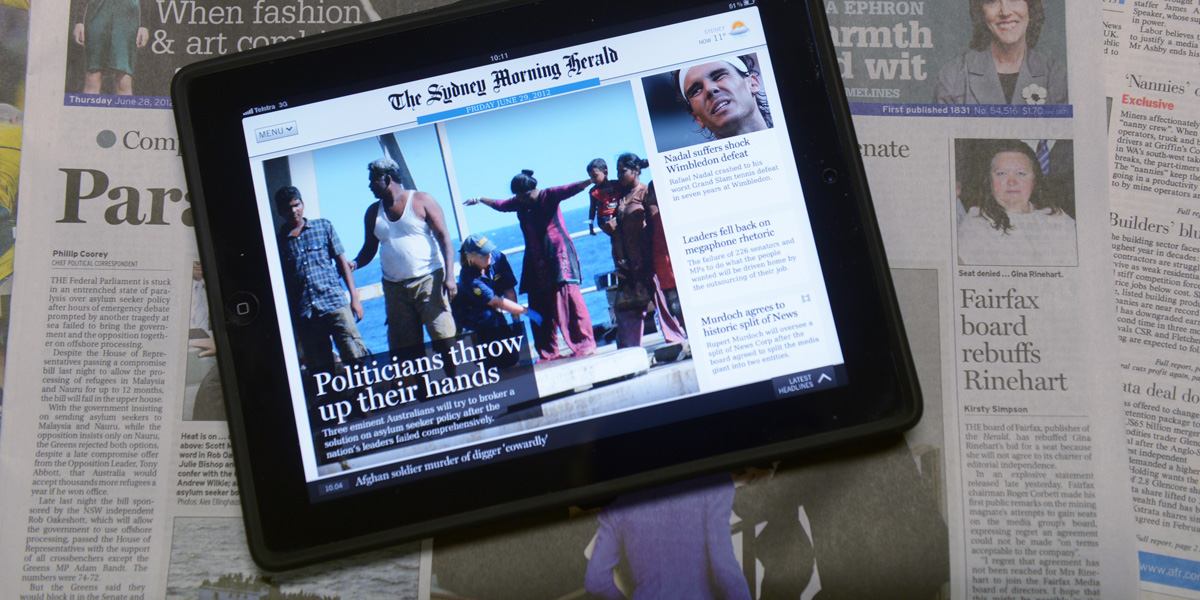In this week’s column, the Chinese show South Australia’s journalists how to respect political leaders, more bad portents for print newspapers, breakfast media habits evolve, and much more.
The Chinese example
After several weeks of impolite debate in Australia about the manners of journalists, the massive South Australian delegation to China this week was shown how it’s done in countries with a more “flexible” approach to democracy.
At a press conference in Shandong province to kick off the week, The Advertiser’s Chris Russell was the only western journalist with the opportunity to ask questions during interviews with the Premier and the Vice Governor.
The Chinese journalists asked their questions politely and demurely. Russell pitched in with a gentle inquiry to Premier Jay Weatherill.
After receiving a pat response to his first question, he followed up by asking Weatherill what Australians could learn from the Chinese.
“Leaders command a great respect, something the South Australian media could learn,” Weatherill replied with his tongue firmly in his cheek.
Nicely played.
Screens continue to rip print
Rupert Murdoch’s News Corp yesterday announced it was canning its once-popular eastern states free newspaper mX.
mX, which was given away at train stations and the like, was launched in Melbourne by founding editor Phil Gardner back in 2001. Gardner went on to become editor of Adelaide’s Sunday Mail.
mX was a bright and breezy product that targeted bored commuters in Melbourne, Sydney and Brisbane. When it was launched, the most engaging diversion on a mobile phone was the game snake.
Today, hardly anyone reads newspapers on the bus or train. Everyone has their head buried in a phone or tablet.
News Corp CEO Julian Clarke admitted as much in an email to staff announcing the closure (according to Mumbrella).
“MX has since its inception in Melbourne in 2001 served a young commuter audience well with its fresh and innovative style. Nevertheless that audience’s swift shift to mobile information and entertainment has made this decision inevitable. Obviously news.com.au and our masthead websites are well used by the commuter audience.”
It’s no coincidence, then, that News Corp has launched a massive advertising campaign for its trivia-laden national website, news.com.au.
The ad includes the rather odd claim that: “At news.com.au we don’t just write the news, we write it to be read by Australians”.
Out of focus
Rather awkwardly, just days before mX was axed News Corp’s group editorial director Campbell Reid ordered his troops to renew their focus on print and expressed confidence in the future of newspapers.
“The question is not, when is the internet going to kill newspapers, but why has it failed to do so,” Reid said, according to a report in The Australian.
It raises questions about whether Reid, well respected within News Corp, was in the loop on the impending mX closure when he delivered his newsprint call to arms.
The chain of circumstances also raises more doubts about whether the media empire is united in its strategy.
Marmalade smudged iPhones
In more bad news for print nostalgists, Roy Morgan Research this week revealed that online has overtaken print at the breakfast table.
Industry optimists had hoped the romance of the tactile morning ritual of crunchy toast and crinkly newsprint would keep digital at bay, particularly on weekends.
The evidence is starting to point to a different reality, with sales of Saturday and Sunday newspapers in freefall.
Roy Morgan found that in the 12 months to March 2015, 72% of Australians reported using one or more forms of media at breakfast time.
“However an increasing proportion of us are going online first thing in the morning: now 16.2%, up from 8.5% in the year to March 2010,” says the research company.
“As sun-up internet usage has become more common, consumption of newspapers has declined — and been overtaken as the third most-common morning media ritual: 15.9% of us now read newspapers at breakfast, down four percentage points since 2010.
“Although radio remains the most popular breakfast media with 28.1% of Australians tuning in, this is also down over 4% points since 2010. Only morning television has escaped unscathed, with a virtually unchanged 23.4% of us switching it on over breakfast.”
Does The Asvertiser still have sub’s?
There but for the grace of God go I and all that …. but, still, this is an extraordinarily scrambled headline for a Saturday paper.
Note: newspaper journalists, often to their chagrin, don’t write the headings. And Mr Starick’s analysis was good. The story deserved better.
Naughty corner
Every news organisation in Australia that published a story about “nipple gate” is sitting in the naughty corner this week.
To explain very briefly, a presenter on a TV show wore a dress with prominent seams that some people mistook for her nipples poking into the fabric.
That’s it.
While countless Australian journalists take their jobs and responsibilities very seriously, editors are increasingly wasting their time by forcing them to serve up cheap regurgitations of “what happened on the tele last night”.
It’s dull, it’s boring and, while we’re ranting, the “gate” suffix actually refers to a piece of complex and courageous investigative journalism. To use it in this context serves only to remind us of the degradation, in some quarters, of our profession.
Top of the class
On a much more positive note, the best of South Australian journalism will be recognised in tomorrow night’s SA Media Awards. InDaily is in the running for a few gongs. UPDATE: Go here for all the winners.
Media Week is published on Fridays.








